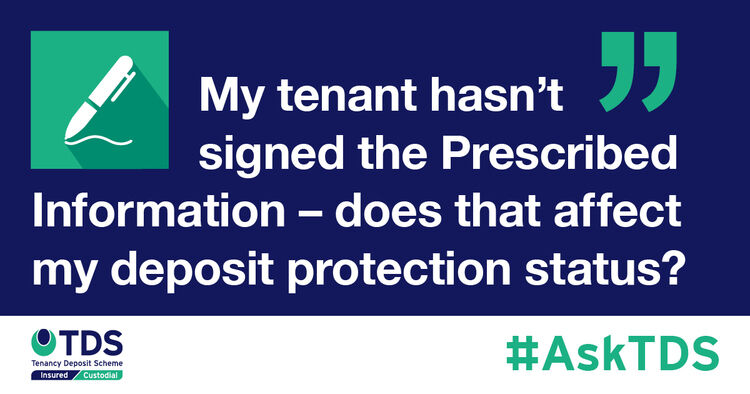
This article has been written in response to a landlord’s query: “Tenant hasn’t signed the Prescribed Information – does that affect my deposit protection status?”
The legislative requirement is set out in The Housing (Tenancy Deposits) (Prescribed Information) Order 2007 and requires that the landlord gives the tenant the opportunity to sign any document containing the information provided by the landlord.
TDS does recommend that the landlord/agent take as many steps as necessary to give themselves proof that this was provided to the tenant. Whichever method you use to give the Prescribed Information to the tenant there is usually a way for you to prove you sent this information. For example, if sending via email, send with read receipts, request confirmation of receipt and follow up a few days later. If you are providing the information in person, you will of course have an opportunity to ask the tenant to sign it there and then.
Using your evidence, you should be able to prove that the Prescribed Information was sent in reasonable time. For example if you sent by post, we would recommend sending recorded delivery and keeping the receipt. Recorded delivery also provides you with a signature and time/date of delivery upon completion meaning that you can identify who received the document. When sending by post it is recommended that you leave enough time for the item to be delivered, even with delays.
In short, the requirements of the prescribed information are legislative, rather than required by TDS, and the tenant’s failure to sign the document does not prevent access to TDS or our dispute resolution service. The requirement is to give the tenant the opportunity to sign it. If a tenant thinks that the landlord has not complied with the legislation, they may raise an action in court for non-compliance. TDS will not consider any such claims, and we do not take the serving of the prescribed information into account when adjudicating over the return of the deposit.
The Tenancy Deposit Scheme (TDS) is a government approved scheme for the protection of tenancy deposits; we offer both insured and custodial protection. We also provide fair adjudication for disputes that arise over the tenancy deposits that we protect.
TDS can only comment on the process for our scheme, other deposit protection schemes may have a different process/require different steps. Content is correct at the time of writing.